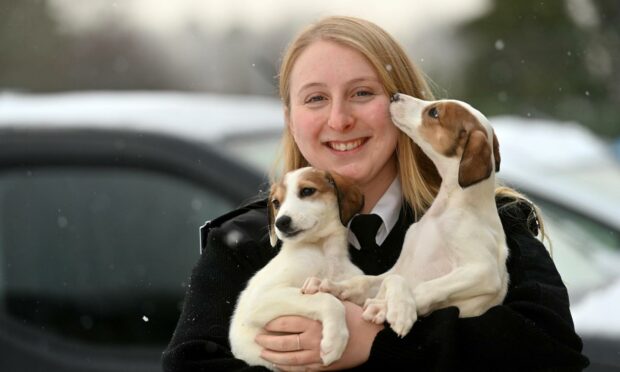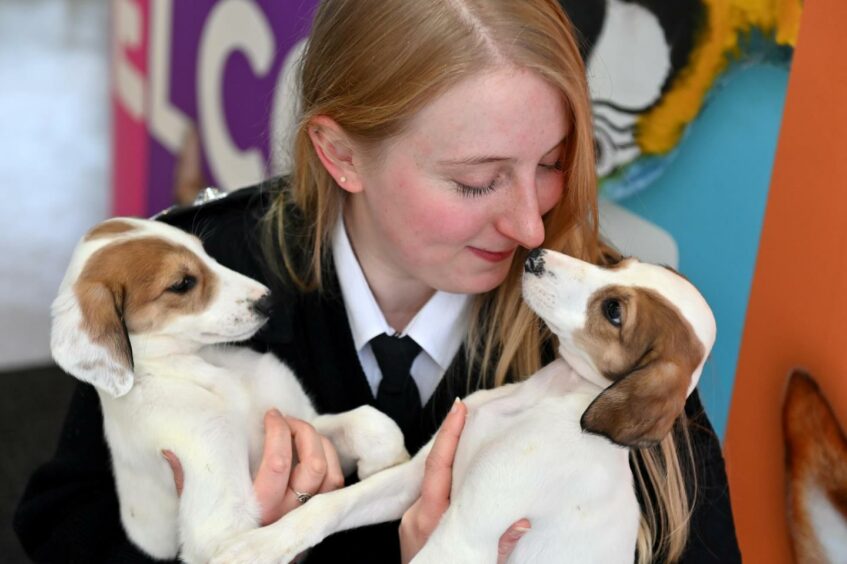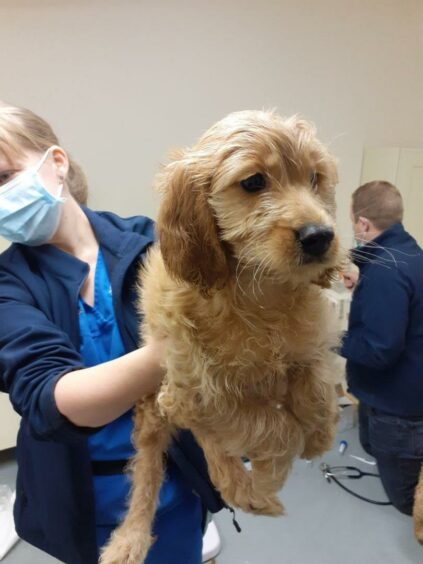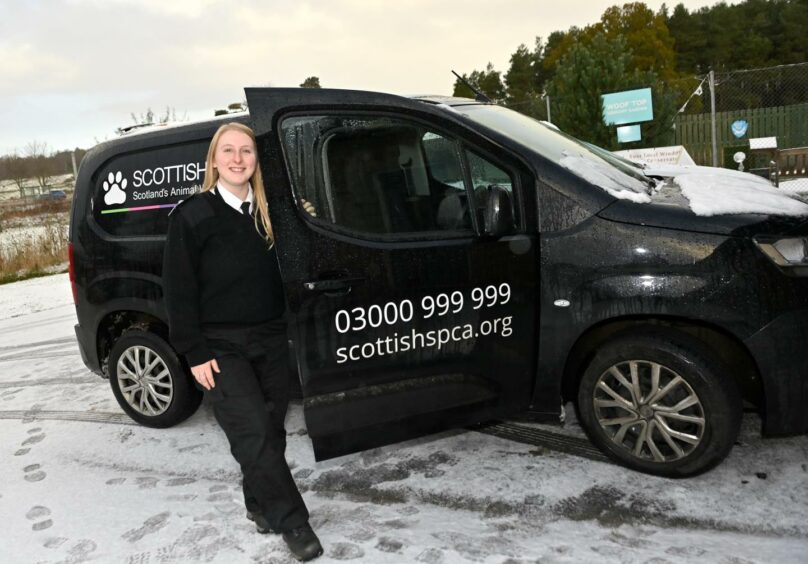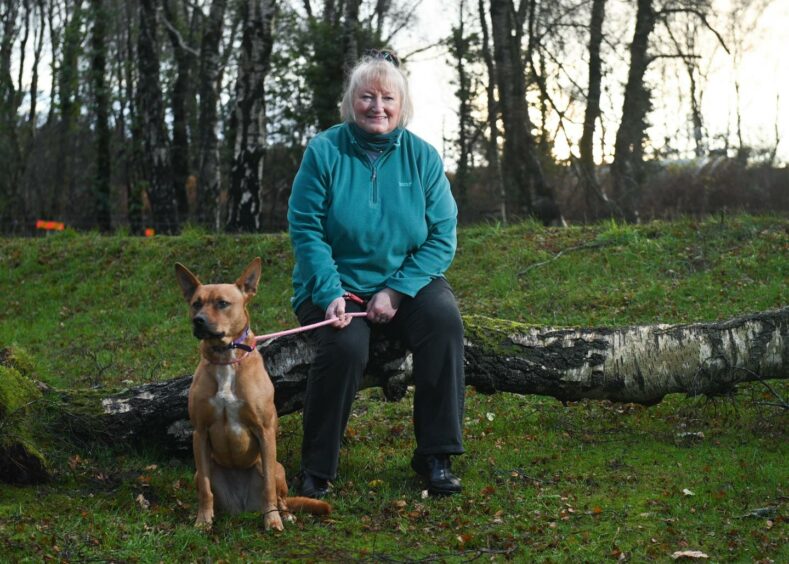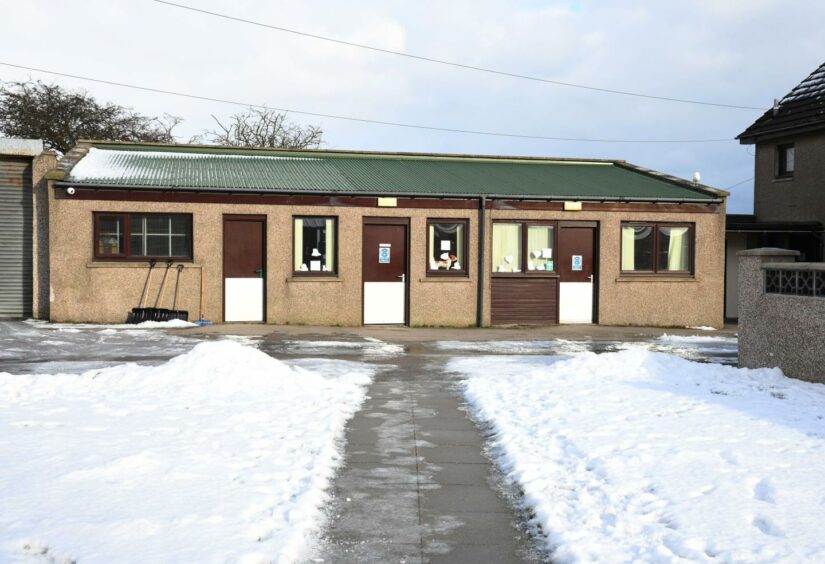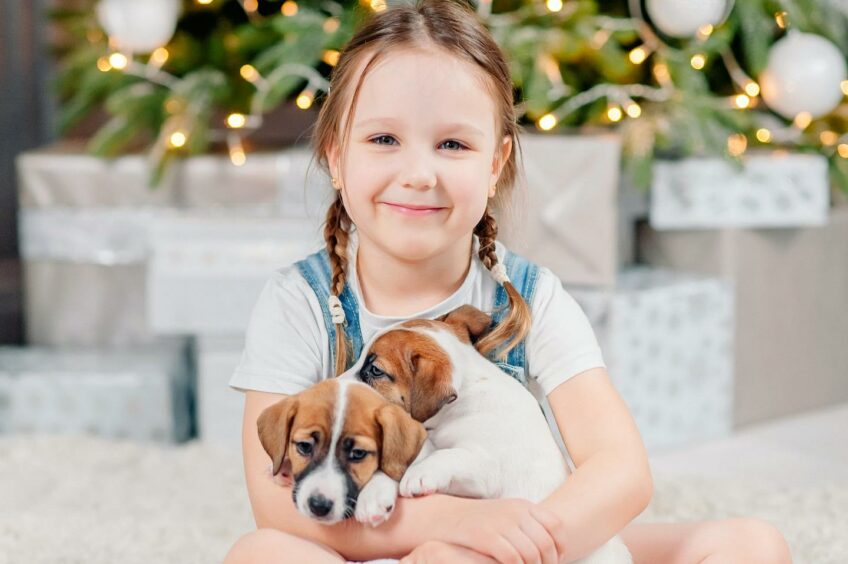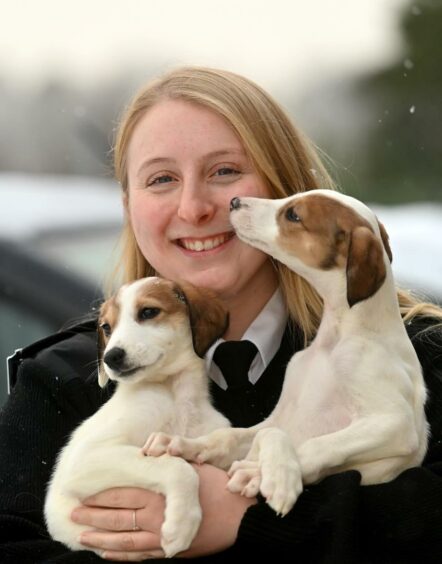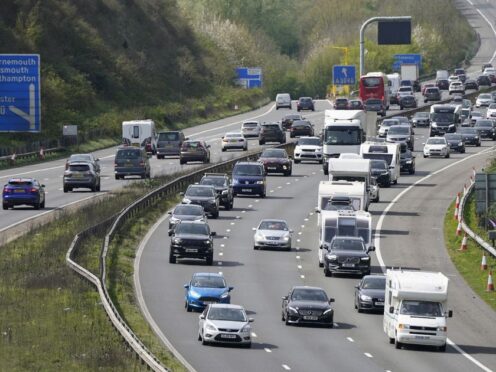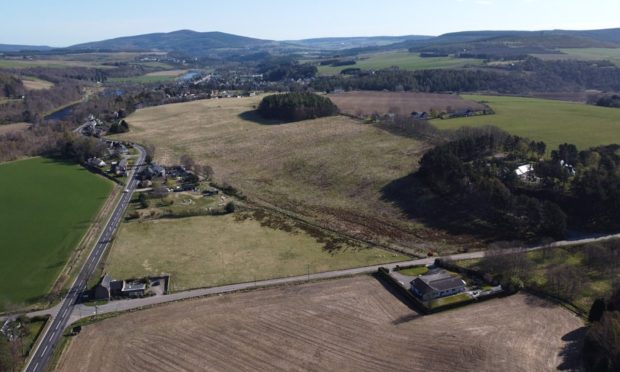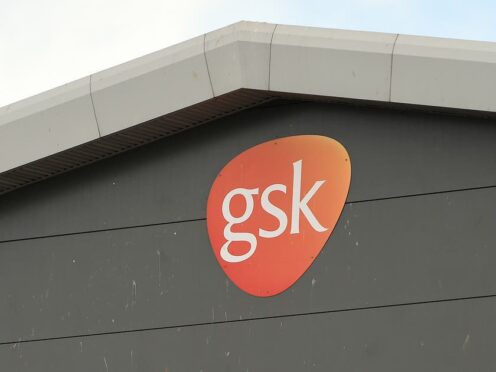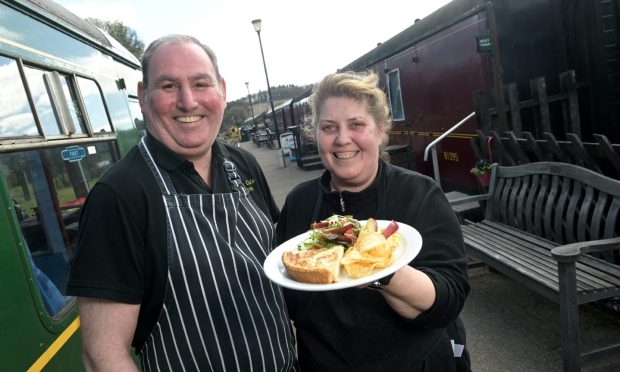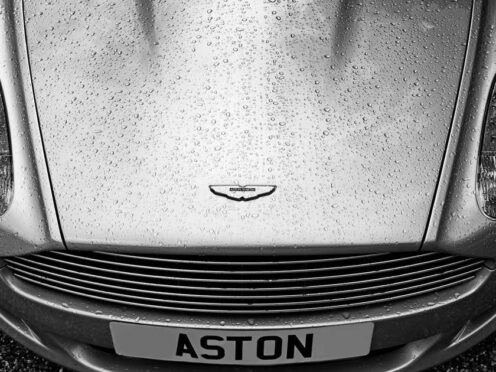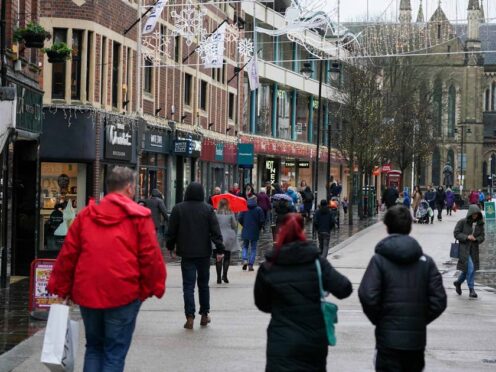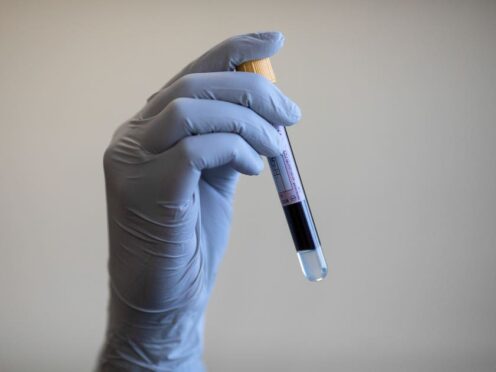Patience? Check. Bravery, stamina and compassion? Check, check and check. It takes a special breed of human to work on the frontline of animal welfare.
The hours are long, the work is challenging and the problems are considerable and complex.
This month the Scottish SPCA launched its #KeepMeOffYourXmasList campaign to stop people and animals suffering as a result of buying sick or dying puppies from low-welfare breeders.
The campaign comes after a raid by the charity on bad breeders in the Aberdeen area in which the dealers fled and four cockapoo puppies had to be rescued after they were dumped in a bush at the side of the road.
It is just one of countless cases faced by the charity and other rescue and rehoming organisations, and this week three dedicated workers talked to the P&J about their roles.
Alexandra Campbell, Aberdeen area inspector for Scottish SPCA
Alexandra studied zoology at university and joined the charity almost two years ago. She attends calls across the region for welfare issues such as neglect, abandonment or cruelty.
She said: “It’s usually quite a busy day if you’ve got jobs all over the place, you can be driving about most of the day.
“What I enjoy most about the job is watching an animal’s welfare improve whether that’s working with the owner and seeing them improve that way or whether it’s removing an animal from the situation and them being in the care of the centre, but you do definitely see a difference and it’s really rewarding.
“Normally, the most difficult challenge is the people rather than the animals, so I try and work with an owner rather than taking the route of reporting them, to give them a chance to work with us.
“Obviously some of the cases that we get are quite upsetting, and if you were not in the job it can be quite traumatising to see, but as I say, seeing the welfare improve when they are in our care balances it out.”
Proudest moments
“My proudest moments are with the puppy farming jobs that we get. I’ve had about three now that we’ve managed to intercept and get the dogs out of the situation.
“All jobs are so different and although we can intercept and get the puppies away from the puppy farming trade, it doesn’t end the trade but it definitely makes it more difficult for the puppy dealers.”
Report, not rescue
Alexandra’s message is for people to report, not rescue.
“The baseline of our campaign is to stop people buying puppies from low-welfare dealers.
“The biggest thing people can do to help is to not buy them.
“Even if people are going to see a puppy and they think ‘this could be a puppy dealer’, don’t buy it on the terms of ‘I think I’m rescuing the dog and taking it to a better situation’ because the money is still going in the pockets of the breeders and it’s still enabling the trade.
“Report it rather than buy it. You are buying a sick puppy that could possibly die within the next couple of days.
“Obviously a lot of people would see it and be concerned, they think they are helping the situation, but with the condition of a lot of the pups, they are quite sick and you maybe wouldn’t notice that until you got it home and it was possibly too late.”
It can sometimes be difficult for people to tell if they are dealing with a puppy farm, so what should they look out for?
Pups for sale
Alexandra explained: “You’re not looking for a typical ‘farm’ where there are dogs sitting in poor conditions.
“You’re looking out for someone where there is constantly litters of puppies being bred and constantly pups for sale.
“Usually the puppies are taken away from their mums too early which is why they end up sick because they are not getting the nutrients from their mum that they need.
“The difference between that and a licensed breeder is the breeder will have the right paperwork, they’ll have mum nearby or in the house with them, that’s what you are looking for.”
Red flags
What other red flags are there?
“Not seeing mum is the biggest one. Don’t buy from anyone other than a registered dealer.
“If you think the puppies seem lethargic, smelly, not as boisterous and energetic as a puppy would be… that can indicate that they are not very well.
“The other things we advise is don’t buy from Gumtree; anybody can sell anything on Gumtree, there are no regulations there.”
But long before trying to buy, people they need to think carefully about what pet ownership involves, warned Alexandra.
Surge in demand
“Obviously with lockdown there’s been a surge in demand for puppies and that’s another issue,” she said.
“People have got puppies and their circumstances have then changed, they may be back to work or not working from home as often and then the dog is not used to that and they get a lot of anxiety.
“You need to think about the time you can spend with the animal, the time that you can provide for it, especially if buying a puppy rather than an adult dog.
“It’s like having a child. You do need to be there, you do need to put the time and effort into spending time with the dog, gaining its trust and for training.”
Elizabeth Mackenzie, secretary, Banff and Aberdeenshire Rescue and Rehoming Kennels (barrk)
Elizabeth is a founder member of barrk, which was established in 1996.
“I have happily been volunteering with barrk for 25 years, I love it,” she said.
“A working day is always varied, that’s what makes it so interesting, anything from dealing with an emergency, to helping people through the often very painful process of placing their dog into the care of barrk for adoption, or being out and about doing home checks.
“It is immensely rewarding to see the joy of placing a dog with its new family.
“But it is always a challenge to have sufficient funding to support the work we do; in a typical year expenditure on our charitable activities will exceed £60,000.
“We rely on the income from our charity shop and we actively seek funding from third-party grant givers to help us.”
Pandemic
Has Elizabeth noticed any impact lockdown has had on pet ownership?
“Yes, we are aware, probably as most other dog charities, that the pandemic has prompted people to take on a dog as they have more time at home. We have already had dogs come into our care as people have had to return to their workplace,” she said.
So what advice does she have for anyone currently thinking of becoming a dog owner?
“Our advice to anyone contemplating getting their first dog is always do your research and be cautious about obtaining a dog online.
“The notion of ‘having’ a dog is not quite the same as the reality, having a dog is a big commitment, emotionally, financially and you need to ensure you have sufficient time to meet the needs of the dog.”
And as for buying a pup as a gift, her message was emphatic.
“Don’t,” she said. “A dog is not something you can just pack away after Christmas.”
Elizabeth added that anyone wishing to support barrk can visit the website, buy the 2022 calendar, donate through JustGiving, give via Amazon Smile, become a member, or leave a legacy.
Heather Fowlie plays with Sparky, one of Mrs Murray’s oldest residents
Heather Fowlie, animal care assistant at Mrs Murray’s Cat and Dog Home, Aberdeen
Heather joined the team at Mrs Murray’s in September 2019. “Previously I worked at the Evening Express as a photographer but decided to leave to pursue my passion for animals,” she said.
“My father was a police dog handler and I wanted to follow in his footsteps by pursuing a career that involved dogs.
“We begin work at 8am where we let the dogs out into the runs, disinfect their kennels and freshen up their bedding.
“The rest of the day is a combination of cleaning, preparing food, freshening up the dogs, enrichment and spending some time one-to-one with the animals in our care.
“Around 4pm we take all the dogs back into their kennel block and we give them their supper before we wash and disinfect the runs fully.
“The best part about my job is working with a variety of different breeds of dogs that come through our doors every year for rehoming and having a hand in helping to rehabilitate them and prepare them for a new chapter in their life with a new family.
“Seeing the transformations of some of the animals that may have had a rough start in life and being part of their journey to grow into confident and loving individuals is the driving force behind why we do what we do.
“I also love seeing our regular boarding customers and their four-legged fur babies when they come to visit for their holidays.
Trust issues
“Sometimes we get animals that have trust issues with people and/or other dogs.
“Patience is key. No dog, no matter the background, can come into a kennel environment and instantly adapt, especially if they aren’t used to being around other dogs or loud noises.
“When our cats and dogs go to their new forever homes, they need time to adapt, so we make sure people understand they won’t get the ‘perfect pet’ straight away and it could take weeks or months for some to feel properly secure in their new home.
“The animals we have are loving and sweet and come into us through no fault of their own, for reasons such as a relationship breakdown or an elderly owner that has passed away.
Kennel environment
“My proudest moment was when we had a rescue dog who was terrified of everyone and everything.
“He was called Lucky, he didn’t cope well in the kennel environment, so my boss Marie allowed me to foster him for a few months until we could find him his forever home.
“He needed a quiet space where he could have consistency and a safe space of his own. I have two of my own rescues from Mrs Murray’s, so he learned how to play with other dogs and became more confident and spooked less as time went on.
“I know his owner and have continued to look after him when she is on holiday. I am proud that I could be his safe place and help him to be less afraid of the world around him.”
“The most important thing to remember about being a pet owner is how tying a pet is.
“Animals are amazing companions but not all pets will be able to cope with changes in your life.”
Time and training
“If you are planning on getting a pet remember they won’t know your routine or what they are and aren’t allowed to do, so they will need time, consistent training and patience to be able to settle in.”
Heather added: “We haven’t really had many ‘lockdown’ pets. Whilst we were locked down we fostered out some of the animals so they would get a break from the kennels and this led to some of our pets being rehomed.”
She echoed the message about not giving an animal as a gift.
“I would strongly advise against buying a pet as a present. Animals are a lifelong commitment not just a present for Christmas or birthdays.
“The person who you are buying the animal for may not want or be able to commit their lives to a pet and that animal may end up in a rescue centre like ours or be sold online to someone that has not been properly vetted.
“Here at Mrs Murray’s we never rehome our animals in the lead-up to Christmas in order to stop people from being tempted to rehome one of our animals as a gift which could lead to the animals being returned to us because the person was not prepared financially, emotionally or environmentally for a new pet.”
